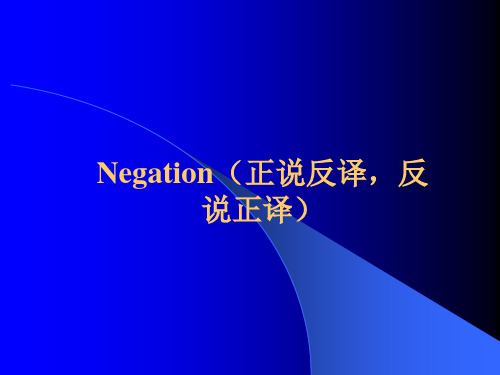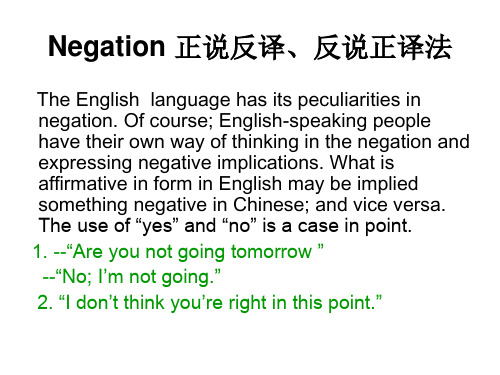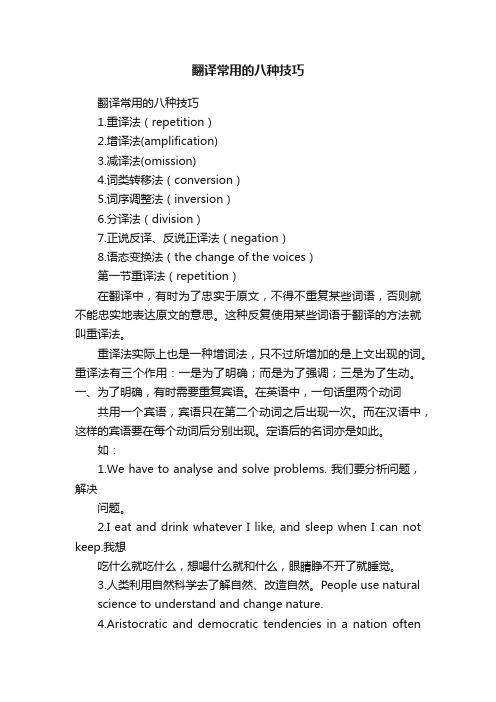正说反译、反说正译法
英汉互译中的正反反正表达法

英汉互译中的正反反正表达法在英汉互译过程中,由于两种语言表达习惯不同,往往需要把英语中的正说译成汉语中的反说,把英语中的反说译成汉语中的正说,或反之,这样才能确切表达原意并符合语言的规范。
这种把正说处理为反说,把反说处理为正说的译法,叫正反、反正表达法。
这种正说和反说的相互转换是翻译技巧中的一个重要方法。
它属于引申和修辞范围。
那么,什么是正说和反说呢?英语词句中含有“never”,“no”,“not”,“non-”,“un-”,“im-”,“in-”,“ir-”,“-less”等成分以及汉语词句中含有“不”、“没”、“无”、“未”、“甭”、“别”、“休”、“莫”、“非”、“毋”、“勿”等成分的为反说,不含有这些成分的为正说。
正说和反说包括的词类范围很广,不仅包括动词、形容词、副词、名词、介词和连词,而且包括各种词组,短语和从句。
现以实例对正反、反正表达法加以说明。
一、英译汉正说反译法在不少情况下,由于有的词语含有特殊意义,如不从反面着笔,译文就不通,这时必须反说。
例如:1)“I have read your articles.I expect to meet an old man.”“我读过你的文章,没想到你这样年轻。
”(动词)2)He was absent from his own country last year.他去年不在自己的国家。
(形容词短语)3)He dived into the water fully clothed and rescued the children.他衣服没脱就跳入水中,把孩子救了上来。
(副词)4)He was extremely sorry for the shortness of time.他对时间不足感到十分抱歉。
(名词)5)I do think that it is beyond his power to fulfill the task.我的确认为要完成这项任务是他力所不及的。
第三章 第六节(反译法)

• 5.The window refuses to open.
• 窗户打不开。
• 6.This would cover my absence from the base. • 这就为我不在基地提供了合法解释。
• 7.Children were excluded from getting in the building.
• 11. Mr. Rumsfeld said the Soviet Union was unprecedentedly engaged in a missile-building program.
• 拉姆斯菲尔德说,苏联正在以空前的规模 推行制造导弹的计划。
• 12.The doubt was still unsolved after his repeated explanation. • 虽然他一再解释,疑团仍然存在.
• 17.Don’t make your conclusion before the end of the year. • 到年底再下结论。
• 18.He returned home with no hope on his face. • 他满脸灰心绝望地回到了家。
C. Affirmation--Negation
• 反饥饿游行
• 反恐战争
• 防尘罩
• 抗拉扯实验
• 从广义上说,任何反说转正说和正 说转反说以及任何相反概念的转译 都属于这种译法。
• 这里讨论的主要指带有否定词的正反翻译。
• 英语中含有no,not,never,none,un-,less,im-,in-,ir-等成分的词句,都被 视为否定表达,简称反说。 • 相反,英语中不含这些成分的词句称为肯定 说法,简称正说。
正说反译-反说正译

“It + be + adj. + noun + that…”句式的反面着笔 译法: (17) It is a wise father that knows his own child. 聪明的父亲也未必了解他自己的孩子。 (18) It is an ill wind that blows nobody good. 坏事未必对人人都有害处。 (19) It is a good workman that never blunders. 智者千虑必有一失。 (20) It is a long lane that has no turning. 凡事总有变化,还会永远不变。
(1) I couldn’t agree more. (2) You couldn’t be better off, could you? (3) Nothing is farther from the truth. (4) I can hardly imagine two men less capable of getting on together. (5) I was weighed down with grief; my friend’s books offered little release, less escape. (6) He could not care less about money.
(6) They didn’t praise him in the slightest. (7) I’m afraid not. (8) I don’t know how often I haven’t warned you. (9) His speech leaves much to be desired. (10) No news is good news.
Negation (正说反译、反说正译)

13. Jim was no end upset because he couldn’t go swimming. 吉姆非常心烦;因为他不能去游泳..短语
14. If it worked once; it can work twice. 一次得手;再次不愁..句子
15. Let bygones be bygones. 既往不咎..句子
5. We may safely say so. 我们这样说万无一失..副词
6. The explanation is pretty thin. 这个解释相当不充分..形容词
7. His refusal is not final. 他的拒绝并非不可改变..形容词
8. He was an indecisive sort of person and always
Leave me alone Go away 别烦我走开
Feel at home. 别见外;别客气.. I went to the airport to meet my friend but
missed her. 我去机场接朋友;可是没接着.. Good winner; good loser. 胜不骄;败不馁..
6. The computer is beyond repair. You might as well buy a new one. 这台电脑修不好了;你不如买台新的算了..
7. Women who do house work by the hour may make nearly as much as public school teachers; if they work the same number of hours. 做家务的钟点女工在同样的时间内;其收入同公立学 校的教师的工资差不多.. 做家务的钟点女工在同样的时间内;挣钱不比公立学 校的教师少..
翻译常用的八种技巧

翻译常用的八种技巧翻译常用的八种技巧1.重译法(repetition)2.增译法(amplification)3.减译法(omission)4.词类转移法(conversion)5.词序调整法(inversion)6.分译法(division)7.正说反译、反说正译法(negation)8.语态变换法(the change of the voices)第一节重译法(repetition)在翻译中,有时为了忠实于原文,不得不重复某些词语,否则就不能忠实地表达原文的意思。
这种反复使用某些词语于翻译的方法就叫重译法。
重译法实际上也是一种增词法,只不过所增加的是上文出现的词。
重译法有三个作用:一是为了明确;而是为了强调;三是为了生动。
一、为了明确,有时需要重复宾语。
在英语中,一句话里两个动词共用一个宾语,宾语只在第二个动词之后出现一次。
而在汉语中,这样的宾语要在每个动词后分别出现。
定语后的名词亦是如此。
如:1.We have to analyse and solve problems. 我们要分析问题,解决问题。
2.I eat and drink whatever I like, and sleep when I can not keep.我想吃什么就吃什么,想喝什么就和什么,眼睛睁不开了就睡觉。
3.人类利用自然科学去了解自然、改造自然。
People use naturalscience to understand and change nature.4.Aristocratic and democratic tendencies in a nation oftenshowthemselves in its speech.民族的贵族倾向和民族倾向常在其言语中表现出来。
5.我们来修改安全规则和卫生规则吧。
Let’s revise our safety andsanitary regulations.二、英语常用省略,但为了明确,也为了强调某些内容,在汉语中常常要将省去的部分重译出来。
英汉翻译法7——正反译法

⏹在翻译时,对于中国学生来说,某些否定句犹如陷阱,稍有不慎,就会掉入其中。
鉴于此,我们在翻译某些含有否定意义的句子时,应当把握两点:一、英语里有些从正面表达的词或句子,译文可从反面来表达,即正说反译法;二、英语里有些从反面表达的词或句子,译文可从正面来表达,即反说正译法。
例如:⏹1) Only five customers remained in the bar.⏹酒吧间只有五个顾客还没走。
⏹(原文从正面表达,译文从反面表达。
如译成“还留着”,或“还呆在那里”,则不如“还没有走”更符合汉语习惯。
)⏹2)Anyone wants to get out? Over my dead body!⏹只要我活着,谁也别想出去。
(the original English sentence implies “nobody can get out unless you kill me).⏹3) Mother said Father would come soon, but Mary knew better.⏹妈妈说爸爸很快就会来了,玛丽知道不会。
(“know better” implies that Mary thoug ht differently or disagreed with Mother, it means “think otherwise”)⏹5) A radar screen is not unlike a television.⏹雷达荧光屏跟电视荧光屏一样。
⏹(如译成“雷达荧光屏不是不象电视荧光屏一样”则不符合汉语习惯。
)⏹我们可以看到,正面译不顺,不妨从反面译;反面译不顺,不妨从正面译,因为同一个概念,一个民族正面说,认为是合乎表达习惯的,而另一个民族则认为反着说才顺嘴。
⏹下面从正说反译和反说正译这两个方面来探讨英语否定结构汉译的一般原则⏹一、正说反译法(Affirmative in English, but Negative in Chinese)⏹英语中的含蓄否定词或含蓄否定短语一般都要译成汉语的否定词组。
正反反正译法
If you refuse to follow my advice, you must take the consequences. 如果你不听我的劝告,后果由你负责。 Now that the boy was earning his own living, he could defy his father's strict rules. 如今男孩已自立更生,他可以不受父亲的严厉管束。 I know he wanted to bootlick me, but I ignore him. 我知道他想要拍我马屁,但我才不吃那一套。
名词
The machine has two serious disadvantages. 那台机器有两个严重缺陷。 The dishonesty of the city officials was exposed by the newspaper. 市政府官员们的欺诈行为在报纸上披露出来。
短语
To be or not to be, that is the question. 生存还是毁灭,这是值得考虑的。 There is nothing like mineral water to quench one’s thirst. 矿泉水是解渴的最好饮料。
bootlick: try to gain favor by cringing or flattering 拍马屁,谄媚
take the consequences: 承担后果
名词
We were perplexed by his failure to answer the letter. 他何以不覆信, 我们大惑不解. Shortness of time has required the omission of some states. 由于时间不够,没能访问某些国家。
7正反、反正译法
【译文】凡是活在世上的人都曾有过神仙般 的几段绝好时光。(双重否定表示强烈肯定)
12
例5:The significance of these incidents wasn’t lost on us.
【译文】这些事引起了我们的重视。
例6:He has no small chance of success.
【译文】她忍住没有笑。
例5:The thick carpet killed the sound of my footsteps. 【译文】我走在厚厚的地毯上一点儿声 音也没有。
18
例6:The pursuit of science withdraws interest from external things. 【译文】科学家由于致力于科学研究, 对外界事物总是不感兴趣。 例7: My guess is as good as yours. 【译文】我的猜测并不比你的高明。
14
课堂互动1: 翻译句子, 注意否定译肯定
1.Students, with no exception, are to hand in their papers this afternoon. 【译文】今天下午,学生统统要交上书面作业。 2.Styles come and go, but good taste is timeless. 【译文】文风随时在变,而文雅是永恒的。 3.All the articles are untouchable in the museum. 【译文】博物馆内一切展品禁止触摸。 4. No one has nothing to offer to society. 【译文】人人对社会都有所贡献。(双重否定用 来表示强烈肯定)
正说反译、反说正译法
• 老师发现有些学生不在。
精品..
正说反译法(形容词)
• She said angrily,the men are all bad! • 她愤愤地说,男人都不是好东西! • You are a bad boy! • 你是个不听话的孩子! • The company’s failure was due to bad
• He is above meanness and deceit. • 他不至于做卑鄙和欺骗人的事情。
• Her behaviour was above suspicion. • 她的品行不容怀疑、
精品..
正说反译法(虚词)
• Few of my friends speak French. • 我的朋友中几乎没有人说法语。 • This was the last place the colonialists
• The revolutionaries were beaten,refused anything to read,kept for a time in semidarkness as well as in chains.
• 那些革命者当时受到拷打,不准阅读任何书刊..
• The window refuses to open. • 窗户打不开。
trying to avoid you ? • 你知道她为什么总是不想见到你吗? • He tried to avoid answering my
questions. • 他试图避而不答我的问题。
精品..
正说反译法(形容词)
• There are two aspects to everything,to say there is only one is to be aware of one aspect and to be ignorant of the other.
句子翻译正说反译反说正译
proposal with dignity.
正说反译
(一)汉、英两种语言的表达习惯不 同。
• 我很快就可以回老家了。
• It will not be long before I go back to my hometown.
(二)语气的需要。 • 有失才有得。
• You can’t make an omelet without breaking eggs.
正说与反说
• 但是由于汉英两种语言表达习惯 不同,在很多情况下会出现正说 反译,反说正译的情况。
• 我完全同意。 • I can't agree with you more. • 你们大错特错了。 • You couldn't be more mistaken.
正说与反说
• 油漆未干! • Wet paint! • 不好意思! • I‘m sorry. • 外表往往是靠不住的。 • Appearances are often deceptive. • 美国不失体面地接受了这项和平方案。 • The U.S.A accepted the peace
他上火车站去接他的朋友,可是未 能在人群中见到他。
He went to the station to meet his friend, but he missed him in the crowd.
- 1、下载文档前请自行甄别文档内容的完整性,平台不提供额外的编辑、内容补充、找答案等附加服务。
- 2、"仅部分预览"的文档,不可在线预览部分如存在完整性等问题,可反馈申请退款(可完整预览的文档不适用该条件!)。
- 3、如文档侵犯您的权益,请联系客服反馈,我们会尽快为您处理(人工客服工作时间:9:00-18:30)。
正说反译法(虚词)
• He gained little advantage from the plan. • 他从这项计划中没有获得什么利益。
• Some people think that man is the least reliable scientific instruments.
• This was the last place the colonialists would leave,for in it lay rich resources.
• 这是殖民主义者最不愿离开的地方,因为..
• That is the last thing I should expect him to do.
• He is above meanness and deceit. • 他不至于做卑鄙和欺骗人的事情。
• Her behaviour was above suspicion. • 她的品行不容怀疑、
正说反译法(虚词)
• Few of my friends speak French. • 我的朋友中几乎没有人说法语。
翻 译 理 论 与 实 蔡主 践
子讲 亮
• Wet paint • 湿的漆 • 油漆未干
• John was a fool for danger. • 约翰对危险是个傻子 • 没有一个中国人能懂。只有把fool从反面说
过去,才能豁然开朗。 • 约翰是天不怕地不怕的。 • 这就是正说反译,反说正译法 negation
• The teacher found some students absent.
• 老师发现有些学生不在。
正说反译法(形容词)
• She said angrily,the men are all bad! • 她愤愤地说,男人都不是好东西!
• You are a bad boy! • 你是个不听话的孩子!
• 证据确凿,毋庸置疑。 • People under 21 are excluded from
joining the club. • 二十一岁以下的人不得参加这个俱乐部
• The plan failed and for years he lost his political power.
• 计划失败了,他在政治上多年不得志。
lost to the world. • 他正在看书,对周围的一切都不加注意。 • Good advice is lost on him. • 忠告对他不起作用。
正说反译法(名词)
• And this failure to recognize and analyze the inter-relationship of linguistic and nonlinguistic problems produces two major signs of ineffectiveness.
正说反译法(副词)
• He has become understandably restless. • 他变得焦躁不安,这是不难理解的。
• He dived into the water fully clothed and rescued Mr. And Mrs. Glen.
• The revolutionaries were beaten,refused anything to read,kept for a time in semidarkness as well as in chains.
• 那些革命者当时受到拷打,不准阅读任何书刊..
• The window refuses to open. • 窗户打不开。
• 怀特先生并没有对该国的政变发表正式评论
• She refrained from laughing. • 她忍住了,没有发笑。
正说反译法(动词)
• He shot at it,but missed. • 他朝它开了枪,但未射中。
• I arrived too late and missed the train. • 我抵达时已太迟了,没有赶上火车。
• The company’s failure was due to bad management.
• 公司因经营不善破产。
• Bad living habits • 不良的生活习惯
正说反译法(形容词)
• His key was lost. • 他的钥匙不见了。 • He was reading his book,completely
正说反译法(动词)
• Today he failed to get to school on time. • 他今天没有准时到校。
• If the crops fail there will be a serious food shortage.
• 如果谷物收成不好,将会出现严重的粮荒
• The letter failed to arrive. • 信没有送到。
正说反译法(动词)
• The minister has denied these allegations
• 部长不承认这些指控。 • Permission to enter was denied. • 不准入内。 • I was denied the chance of going to
university. • 我得不到上大学的机会。
• His secretary failed to tell him about it. • 他的秘书没有告诉他。
正说反译法(动词)
• They excluded children from getting in.
• 他们不准小孩入内。
• The evidence is conclusive, excluding all possibilities of doubt.
• 政府对选举时所作的保证没有付诸实行。
• Tom will be in charge of the office during my absence.
• 我不在的时候,办公室由汤姆负责。
• Why does he say nothing about the total absence from his list poems about the Paris Commune?
• Slips are scarcely avoidable when you’re new to your work.
• 工作没有经验,出点差错在所难免。
• A young clerk new to the job • 对工作还不熟悉的年轻办事员
• He is often absent-minded. • 他常常心不在焉。
• 他试图避而不答我的问题。
正说反译法(形容词)
• There are two aspects to everything,to say there is only one is to be aware of one aspect and to be ignorant of the other.
• 任何事物都有两点,说只有一点叫只知其一 不知其二。
• 他开的单子里根本没有关于巴黎公社的诗 歌,对此他为什么只字不提呢?
正说反译法(名词)
• He tries to overcome the lack of technical data.
• 他试图克服技术资料的不足。
• Her abstraction was not because of the tea party.
正说反译、反说正译法
• 1、正说反译法(动词) • 2、正说反译法(形容词)
• 3、正说反译法(名词) • 4、正说反译法(虚词) • 5、正说反译法(短语)
正说反译法(动词)
• 含否定意义动词可反译fail,miss, lack,ignore,refuse,withhold,refrain,deny, overlook,exclude,neglect等
• The County Party Committee here is ignorant of conditions at the lower levels.
• 那里的县委不了解下情。
• He is not only stupid,but also ignorant. • 不仅愚蠢,而且无知。
正说反译法(形容词)
• Such a chance was denied me. • 我没有得到这样的机会。
• Ex-Governor Stark remained a private citizen.
• 前州长斯塔克从此一直没能当官。
• Their action amounted to treason. • 他们的所作所为无异于卖国。
正说反译、反说正译法
• Negation 在语法与翻译两个不同的学科 中含义不同。
• Negation作为一种翻译技巧,指在翻译实 践中,为了使译文忠实而合乎语言习惯地 传达原文的意思,有时必须把原文中的肯 定说法变成译文中的否定说法,或把原文 中的否定说法变成译文中的肯定说法。
• 而语法中的negation则指“否定”,含完 全否定,部分否定,双重否定等。
• 个别家庭无力解决的这个问题,通过集体 能迅速得到解决。
正说反译法(介词)
• There is nothing in this shop above $5. • 这家商店卖的东西价钱都不超过5美圆。
• Leifeng’s noble deeds are above all praise
• 雷锋的高尚事迹令人赞扬不尽。
正说反译法(动词)
• Avoid operating the keys roughly. • 使用按键不要用力过猛
• Do you know why she is always trying to avoid you ?
